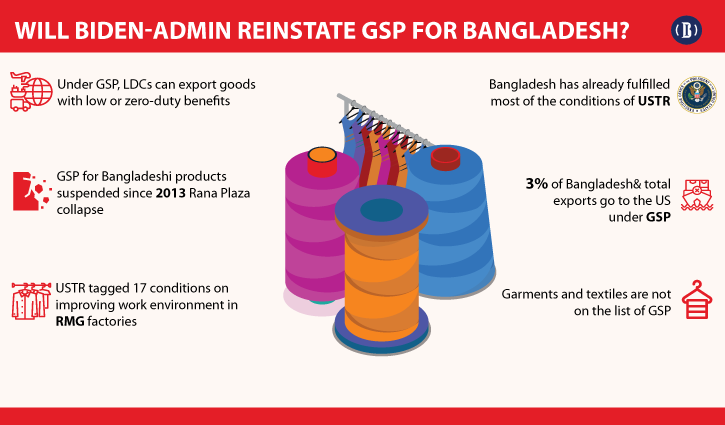Bangladesh to seek revival of GSP from Biden administration
BI Report || BusinessInsider

Business Insider
Bangladesh will seek reinstatement of the Generalised System of Preference (GSP) from the Biden administration to revive the trade preferential access to the US market.
“We’ll shortly write to the United States Trade Representative [USTR] after US President-elect Joe Biden assumes office in January,” said Hafizur Rahman, the director-general of the World Trade Organisation (WTO) cell under the commerce ministry.
GSP introduced by the US in 1976 is a trading scheme under which the US allows the import of more than 5,000 goods from least developed and developing countries with lower or zero-duty benefits.
The trade benefit under the scheme for the Bangladeshi products remained suspended since 2013 when Rana Plaza building collapsed—the country’s biggest industrial disaster that killed more than 1,100 people, mostly apparel workers.
“The government will request the US to reconsider duty-free trade for RMG products under the GSP facility, which is urgently required now to deal with the coronavirus pandemic and LDC exit,” said Rahman.
He hoped that Bangladesh would be given back the facility by the USTR, as the country has already fulfilled most of the conditions of the USTR.
In line with its action plan, the USTR tags 17 conditions on improving the working environment in the RMG factory and international organisations are no longer complaining about the issue.
Earlier, Bangladesh made several attempts to get back the GSP scheme during the Trump administration, but it got no response.
“To get the trade facility from the US government, Bangladesh needs to increase its bargaining skills. It is still Bangladesh's Achilles heel,” said Manjur Ahmed, the former adviser to the apex trade FBCCI.
He said the United States will not give anything to Bangladesh unilaterally. “Demands for duty-free and quota-free benefits need to be negotiated through bilateral relations.”
According to traders, only 3 percent of Bangladesh's total exports go to the US under GSP. Besides, garments and textiles, the main exports of Bangladesh, are not on the list of GSP.
Welcoming the government’s move, BGMEA President Rubana Haque said, “Bangladesh needs to persist with the issue with the Biden administration.”
























